Featured Amicus Briefs
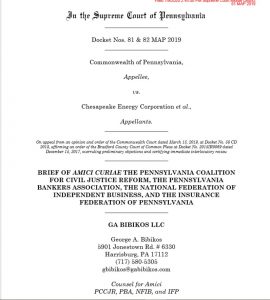
Sectors: Business, Health Care
Commonwealth of Pennsylvania v. Chesapeake Energy Corporation
(1) Are claims by the commonwealth, brought on behalf of private landowners against natural gas extractors alleging that the extractors used deceptive, misleading, and unfair tactics in securing natural gas leases from landowners, cognizable under the Unfair Trade Practices and Consumer Protection Law? (2) May the commonwealth pursue antitrust remedies under the Unfair Trade Practices and Consumer Protection Law? Update: The court agreed with PCCJR's position that the UTPA and CPL does not protect sellers
Status: Opinion issued on March 24, 2021
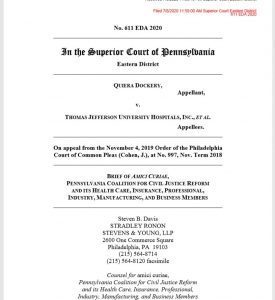
Sectors: Business, Health Care
Dockery v. Thomas Jefferson University Hospital
At issue is the constitutionality of Pennsylvania’s Medical Liability Venue Statute and Medical Liability Venue Rule. The decision of the Superior Court, while not directly on the merits, leaves the medical liability venue rule and statute standing. The Superior Court’s decision is a victory against allowing venue shopping to return to medical liability cases.
Status: Opinion issued February 22, 2021. The Superior Court denied Dockery’s application for reargument on April 26, 2021.
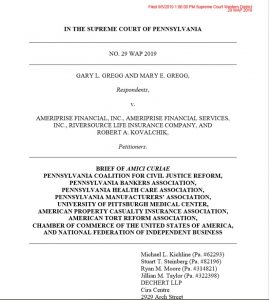
Sectors: Business, Health Care
Gregg v. Ameriprise Financial, Inc.
Whether the Superior Court improperly held that a strict liability standard applies to a claim under the “catch-all” provision of the Pennsylvania Unfair Trade Practices and Consumer Protection Law, 73 P.S. §§ 201-1, et seq., as amended in 1996, even though the provision expressly requires proof of “fraudulent or deceptive conduct.”
Status: Opinion issued February 18, 2021
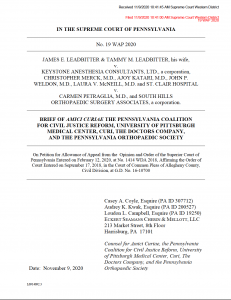
Sector: Health Care
Leadbitter vs. Keystone Anestesia Consultants
This case presents two questions. Does the Superior Court’s holding directly conflict with the Pennsylvania Peer Review Protection Act, by ordering the production of acknowledged “peer review documents” solely because they were maintained in a physician’s credentialing file? Does the Superior Court’s holding directly conflict with the Federal Healthcare Quality Improvement Act and federal regulations which protect from disclosure, responses to statutorily-required inquiries of the national practitioner data bank, by ordering the production of such documents?
Status: Opinion issued August 17, 2021 favorable to health care and the protection of peer review documents from discovery in litigation. It was an unanimous decision authored by Justice Saylor. Justice Wecht wrote concurring statement..
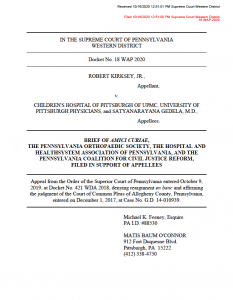
Sector: Health Care
Kirksey vs. Children’s Hospital of Pittsburgh, UPMC, Univ. of Pittsburgh Physicians, and Satyanarayana Gedela, MD
At issue: Must a limiting jury instruction be given when evidence of general risks and complications are admitted in a medical negligence case?
Status: Supreme Court dismissed the appeal as improvidently granted. Justice Wecht wrote a concurring statement
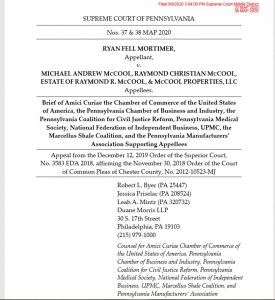
Sectors: Business, Health Care
Mortimer v. McCool
Whether, in this matter of first impression, the Supreme Court should adopt the "enterprise theory" or "single entity" theory of piercing the corporate veil when two or more sister companies operate as a single corporate combine?
Status: Opinion Issued July 21, 2021. The Court declined to adopt a form of enterprise liability for piercing the corporate veil, saying the facts of this case would not allow it. The court did however invite lower courts to take up the enterprise liability doctrine when appropriate under the facts.


